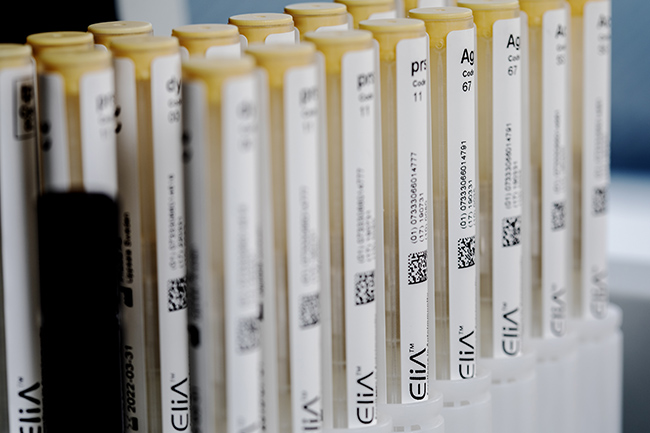ImmunoCAP™ Specific IgE tests
Improve patient outcomes with trusted allergen diagnostics
One blood test can help improve symptom management for patients with allergies.
For laboratorians interested in adding ImmunoCAP to your test portfolio, explore the ImmunoCAP product catalog.

Learn more about ImmunoCAP Specific IgE testing.
The sum of 50+ years of allergy diagnostic research
Backed by years of research and analyzed on reliable and automated Phadia Laboratory Systems, ImmunoCAP Specific IgE assays deliver trusted results by using quality allergen preparations, fluoroenzyme immunoassay technology, and methods that detect even low levels of sensitization.4

Endorsed by the scientific community.
Documented in more than 6,000 peer-reviewed publications and referenced in health guidelines across the world.4
“The ImmunoCAP system considered as the ‘gold standard’ for the in vitro diagnosis of allergic conditions.”1
- European Journal of Allergy and Clinical Immunology
“Accurate. Precise. Sensitive.2
- Journal of Allergy and Clinical Immunology
“ImmunoCAP is the only test accurate and reliable enough… for advanced investigations of patients with IgE-mediated allergy… [as well as being] well suited for use in primary care ”3
- Expert Review of Molecular Diagnostics

Why use ImmunoCAP blood testing?
97%
For atopic patients, correct diagnoses increase from as low as 30% up to 97% when using specific IgE testing alongside clinical history and physical examination.5
Broadly accessible
Irrespective of age, skin condition, antihistamine use, or pregnancy, ImmunoCAP Specific IgE tests can be used for a variety of patient types.6,7
Zero risk
Unlike skin-prick testing, blood testing offers no risk of anaphylaxis to the patient.6,7
Specialized testing, not just for specialists
ImmunoCAP Allergen Component testing aids in patient management by helping to identify which molecules a patient may be reacting to in whole allergens, such as peanuts, tree nuts, milk, eggs, pets, and more.8

How does it work?
Order an ImmunoCAP test
Follow the typical procedures you normally use when ordering laboratory blood tests.6
Speak to a specialist about ordering.
Let the laboratory analyze
The laboratory will process the ImmunoCAP test on Phadia Laboratory Systems.
Receive test results
Assess and interpret ImmunoCAP test results to personalize patient management.
Explore More
Download these helpful resources

Interpretation guides
Whether you’re a primary care provider or a specialist, ImmunoCAP Specific IgE test interpretation guides provide in-depth and clear information that helps to guide patient management decisions.
*Specific IgE blood test results should be interpreted in conjunction with the patient’s clinical history and physical examination.10,11 ImmunoCAP blood test results will indicate whether the patient is sensitized (i.e., has IgE antibodies) to specific allergens. However, sensitization to specific allergens does not always indicate a clinical allergy, as sensitization does not always result in symptoms.12
Explore what ImmunoCAP tests offer.
Have additional questions?
ImmunoCAP Specific IgE FAQ
Access to testing may vary by location; however, most primary care providers can order ImmunoCAP testing. In fact, primary care providers are at the forefront of many allergic disease states. As such, they have the ability to help patients quickly by ordering ImmunoCAP testing during an initial visit.
In addition to primary care, any health care provider who normally orders laboratory testing can order ImmunoCAP testing.
The amount of blood required is dependent upon the number of allergens ordered. Speak to a representative at your laboratory to determine the amount of serum needed.
ImmunoCAP assays contain technology specifically made for allergy diagnostics. Inside every ImmunoCAP test is a three-dimensional cellulose structure that provides more surface area for binding, leading to high assay sensitivity as well as accurate, precise, and sensitive results.2
Allergen components are just that; components of a whole allergen. Like a puzzle piece, they are a part of a bigger picture and allow for a deeper understanding of what a patient may specifically be sensitized to in a whole allergen.
Varying by location, some laboratories offer reflex testing for a number of whole allergens. Therefore, if a patient tests positive for a sensitization to a whole allergen, the test will reflex and test for its available allergen components. This additional information may help to determine patients at risk of systemic reactions or in other cases tolerability of versions of a given allergen.8 Together with patient history this provides insights when developing an optimized management plan.8
While RASTs rely on radioactive tagging, ImmunoCAP tests use fluorescently labeled detection antibodies to measure levels of specific IgEs. The intensity of light emitted when binding to specific IgEs is then measured by a Phadia Laboratory System, which translates the data into results.
For more information, speak to a laboratory professional.
For additional info on ImmunoCAP testing, allergies, and/or educational tools and resources, contact our allergy experts.
Relevant resources
Tools to aid in your diagnosis and patient management.
- Crameri R. The crux with a reliable in vitro and in vivo diagnosis of allergy. Allergy. 2013 Jun;68(6):693-4. doi: 10.1111/all.12177. Epub 2013 Apr 27. PMID: 23621640.
- Van Hage M, Hamsten C, Valenta R. ImmunoCAP assays: Pros and cons in allergology. J Allergy Clin Immunol. 2017 Oct;140(4):974-977. doi: 10.1016/j.jaci.2017.05.008. Epub 2017 May 25. PMID: 28552762. Available from: https://linkinghub.elsevier.com/retrieve/pii/S0091-6749(17)30844-8.
- Johansson (2004) ImmunoCAP® Specific IgE test: an objective tool for research and routine allergy diagnosis, Expert Review of Molecular Diagnostics, 4:3, 273-279, DOI: 10.1586/14737159.4.3.273. Available from: https://www.tandfonline.com/doi/abs/10.1586/14737159.4.3.273.
- Data on file
- Duran-Tauleria E, Vignati G, Guedan MJ, et al. The utility of specific immunoglobulin E measurements in primary care. Allergy. 2004;59 (Suppl78):35-41.Gupta N, Agarwal P, Sachdev A,
- Gupta D. Allergy Testing - An Overview. Indian Pediatr. 2019 Nov 15;56(11):951-957. PMID: 31729325. Available from: chrome-extension://efaidnbmnnnibpcajpcglclefindmkaj/https://www.indianpediatrics.net/nov2019/951.pdf.
- Pali-Schöll, Isabella et al. “Allergic diseases and asthma in pregnancy, a secondary publication.” The World Allergy Organization journal vol. 10,1 10. 2 Mar. 2017, doi:10.1186/s40413-017-0141-8 Available from: https://www.ncbi.nlm.nih.gov/pmc/articles/PMC5333384/.
- Matricardi, P.M., et al., EAACI Molecular Allergology User's Guide. Pediatr Allergy Immunol, 2016. 27 Suppl 23: p. 1-250.
- Eigenmann P A, Atanaskovic-Markovic M et al. Testing children for allergies: why, how, who and when: an updated statement of the European Academy of Allergy and Clinical Immunology (EAACI) Section on Pediatrics and the EAACI-Clemens von Pirquet Foundation. Pediatr Allergy Immunol 2013;24(2):195-209
- Bousquet J, Anto J M et al. Allergic rhinitis. Nat Rev Dis Primers 2020;6(1):95.
- Scadding G K, Scadding G W. Diagnosing allergic rhinitis. Immunol Allergy Clin North Am 2016;36(2):249-260
- Popescu F D, Vieru M. Precision medicine allergy immunoassay methods for assessing immunoglobulin E sensitization to aeroallergen molecules. World J Methodol 2018;8(3):17-36




